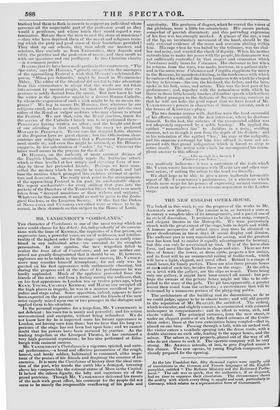MR. VANDENHOFF'S "CORIOLANUS."
THE character of Coriohenus is one of the most trying which an actor could choose for his debut ; for, independently of its associa- tions with the fame of KEMBLE, the requisites of a fine person, an expressive thee, a powerful voice, an air of nobleness, and intellec- tuality of the highest order for the stage—qualities so rarely com- bined in any individual actor—are essential to its complete personation. In our opinion, the new tragedian failed to realize the beau ideal of Coriolanns ; and we are neither sur- prised nor greatly disappointed that it should be so. 11; however, applauses are to be taken as the measure of success, Mr. VANDEN- HOFF may consider himself triumphant; for not only was lie greeted on his first appearance with enthusiastic cheering, but during the progress and at the close of his performance he was loudly applauded. Much of the applause proceeded from the friends of the actor; and from a feeling among time audience, that, on his first appearance in London ten or twelve years ago, when KEAN, YOUNG, CHARLES KEMBLE, and MACREADY occupied all the high places in tragedy, lie was in a manner sacrificed to pre- judice and stage cabal. Sonic opposition, indeed, appears to have been expected on the present occasion; and the friends of the new actor eagerly seized upon one or two passages in the dialogue and applied them to his situation. In the personal requisites for a tragedian, Mr. VANDENHOFF is not deficient : his voice too is manly and powerful; and his action unconstrained and energetic, without being redundant. We do not know how far he is improved since his former appearance in London, not having seen him then; but we hear that his long ex- perience of the stage has not been lost upon him; and we cannot doubt that his powers have been matured by practice. As the leading tragedian at time Liverpool Theatre, he has sustained a very high provincial reputation; he has also performed at Edin- burgh with eminent success. Mr. VANDENHOFF'S Coriolanusis a vigorous, spirited, and natu- ral performance,—a broad and effective personation of the rough, honest, and hardy soldier, habituated to command, alike impa- tient of time praises of his friends and despising the censure of his enemies. It is more time Coriolanus of history than the ideal crea- tion of the poet, who treads the earth like a demigod, towering above his compeers like the colossal statue of Mars in time Capitol. It lacked the inborn dignity, time lofty and imperious air of the proud patrician. Though Mr. VANDENHOFF delivered his taunts of time mob with great effect, his contempt for the people did not seem to be merely the irrepressible overflowing of his pride and superiority. His gestures of disgust, when he craved the voices of the plebeians, were a little too ostentatious. His sneers partook somewhat of peevish discontent; and this pervading expression of his face was too strongly 'narked. A glance of the eye, a curl of the lip, an involuntary movement of the hand, should be the only external evidence of the scorn and aversion abiding within him. his rage when he was baited by the tribunes, was too shal- low and noisy, and wanted the check of dignity. When his mother entreats him to make his peace with the people, his demeanour was not sufficiently controlled by that respect and veneration which Coriolanus really bears for l'olumnia. His obeisance to her when he returns from the wars, was made, however, in a gallentstyle • and in the scene were I'd/zinnia and l it iliu supplicate for mercy to time Romans, lie manifested feeling, in the tenderness with which he embraced his wife, and the manly fondness with which he clasped his boy in his arms—the son, the husband, the father, and the hero, spoke in his look, voice, and action. This was the best part of his performance; and, together with the naturalness with which ho threw in those little homely touches of familiar speech which relieve the loftiest passages in the dialogue of SHAKSPEARE, convince us that he will not belie the good report that we have heard of Mr. VANDENHOFF'S powers in characters of domestic interest, such as the heroes of KNOWLES'S plays.
The two famous scenes with Aufidias were the least successful of his efforts; especially in time first interview, where he discloses
himself. In the last, time violence of the exasperated soldier was
not adequately supported by a noble bearing. He applied the epithet " measureless liar" to Aufidius in a noisy, scolding
manner, not as though it rose from the depth of his disdain : and in his reiteration of the epithet " boy," his rage at the indignity, and his supreme contempt for him who offered it, were not ex-
pressed with that grand indignation which is forced to stoop to notice insult. The action with which he accompanied his trium- phant answer to this affront- . Like an eagle in a dovecot, I
Flaitered your Voices "
was positively ludicrous : it was a caricature of the fault which Mr. VANDENHOFF has in common with Maces:am- and other emi- nent actors, of suiting the action to the word too literally.
We shall hope to be able to give a more uniformly favourable report of Mr. VANDENHOFF'S performance, in a character which affords more scope for his powers of expressing natural emotions. Talent such as he possesses is a welcome acquisition to the London stage.






















 Previous page
Previous page